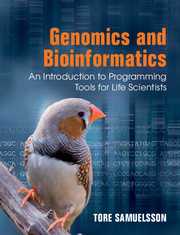Book contents
- Frontmatter
- Contents
- Preface
- Acknowledgements
- Design and conventions of this book
- 1 Introduction: working with the molecules of life in the computer
- 2 Gene technology: cutting DNA
- 3 Gene technology: knocking genes down
- 4 Gene technology: amplifying DNA
- 5 Human disease: when DNA sequences are toxic
- 6 Human disease: iron imbalance and the iron responsive element
- 7 Human disease: cancer as a result of aberrant proteins
- 8 Evolution: what makes us human?
- 9 Evolution: resolving a criminal case
- 10 Evolution: the sad case of the Tasmanian tiger
- 11 A function to every gene: termites, metagenomics and learning about the function of a sequence
- 12 A function to every gene: royal blood and order in the sequence universe
- 13 A function to every gene: a slimy molecule
- 14 Information resources: learning about flu viruses
- 15 Finding genes: going ashore at CpG islands
- 16 Finding genes: in the world of snurpsp
- 17 Finding genes: hunting for the distant RNA relatives
- 18 Personal genomes: the differences between you and me
- 19 Personal genomes: what’s in my genome?
- 20 Personal genomes: details of family genetics
- Appendix I Brief Unix reference
- Appendix II A selection of biological sequence analysis software
- Appendix III A short Perl reference
- Appendix IV A brief introduction to R
- Index
- References
12 - A function to every gene: royal blood and order in the sequence universe
Published online by Cambridge University Press: 05 August 2012
- Frontmatter
- Contents
- Preface
- Acknowledgements
- Design and conventions of this book
- 1 Introduction: working with the molecules of life in the computer
- 2 Gene technology: cutting DNA
- 3 Gene technology: knocking genes down
- 4 Gene technology: amplifying DNA
- 5 Human disease: when DNA sequences are toxic
- 6 Human disease: iron imbalance and the iron responsive element
- 7 Human disease: cancer as a result of aberrant proteins
- 8 Evolution: what makes us human?
- 9 Evolution: resolving a criminal case
- 10 Evolution: the sad case of the Tasmanian tiger
- 11 A function to every gene: termites, metagenomics and learning about the function of a sequence
- 12 A function to every gene: royal blood and order in the sequence universe
- 13 A function to every gene: a slimy molecule
- 14 Information resources: learning about flu viruses
- 15 Finding genes: going ashore at CpG islands
- 16 Finding genes: in the world of snurpsp
- 17 Finding genes: hunting for the distant RNA relatives
- 18 Personal genomes: the differences between you and me
- 19 Personal genomes: what’s in my genome?
- 20 Personal genomes: details of family genetics
- Appendix I Brief Unix reference
- Appendix II A selection of biological sequence analysis software
- Appendix III A short Perl reference
- Appendix IV A brief introduction to R
- Index
- References
Summary
The boy is in such indescribable pain day and night that no one from among his closest relatives, though they do not spare themselves, has the strength to bear looking after him too long, not to mention his mother, with her chronically ill heart.… His attendant…after a few sleepless nights filled with agony, becomes totally worn out and wouldn't be able to take it at all.
(Steinberg and Khrustalöv, 1995)These words are from a letter written by Yevgeny Botkin, the family doctor of the Russian Tsar Nicholas II and his wife Alexandra (Steinberg and Khrustalëv, 1995). The suffering boy is Alexei, the son of the couple, born in 1904 and the successor to the throne of all Russians. He suffered from a congenital bleeding disease known as haemophilia, in which the defect is a missing or malfunctioning blood-clotting factor. The particular haemophilia that affected Alexei is a genetic disease linked to the X chromosome, and for this reason it is more prevalent in males. Females rarely show symptoms of the disease but may carry the gene on to the next generation.
Royal disease
Alexei inherited his disease gene from his great grandmother, Queen Victoria of England (Fig. 12.1). In fact, the queen transmitted her gene to a number of members of European royalty and thus decimated the thrones of Britain, Germany, Russia and Spain. Typically the affected males are exceptionally sensitive to injuries – for example, both Infante Gonzalo of Spain and Prince Rupert of Teck died young as a result of bleeding following car accidents. The last carrier of the disease in the royal family was Prince Waldemar of Prussia, who died in 1945.
Information
- Type
- Chapter
- Information
- Genomics and BioinformaticsAn Introduction to Programming Tools for Life Scientists, pp. 150 - 163Publisher: Cambridge University PressPrint publication year: 2012
